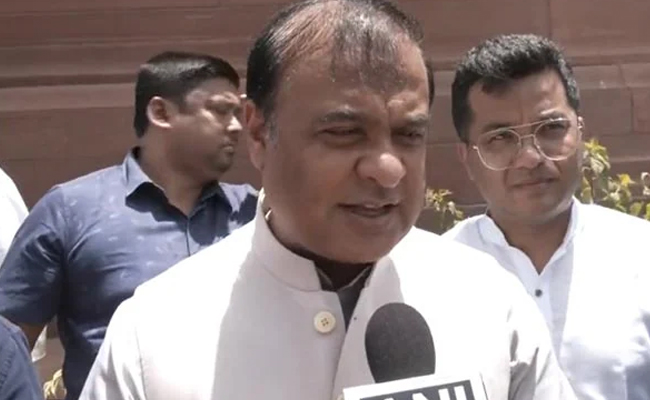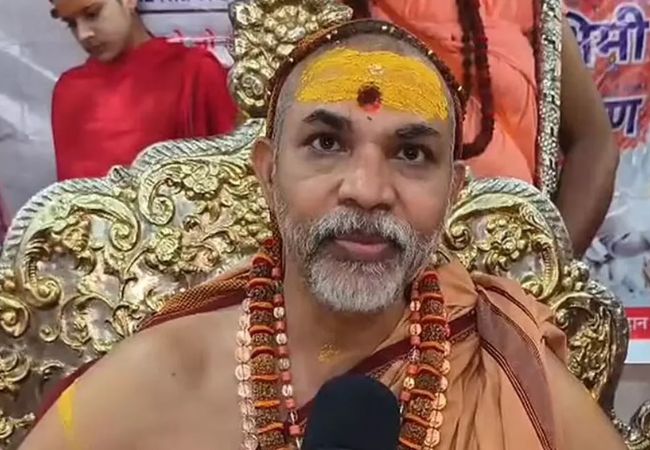Guwahati : Assam Chief Minister Himanta Biswa Sarma announced on Thursday that individuals who were compelled to convert to Islam during the Mughal era have the option to reclaim their "original identity" and qualify for indigenous status.
During a session in the state Assembly addressing his government's efforts to safeguard land rights of indigenous people, Sarma stated, "Islam didn’t arrive in India that early. But if you seek indigenous status based on the community before you were converted, then you will get the indigenous tag."
He further explained that landless migrant Muslims and Bengali-origin Muslims would not be eligible for land titles under Mission Basundhara, an initiative aimed at updating land records and providing land revenue services. Sarma clarified that the initiative, based on a 2019 policy, is reserved for landless "indigenous" people.
Sarma delineated, "Mission Basundhara is not for migrant Muslims...it is also not for Marwaris, Biharis or those who came from other states."
However, he assured that landless Muslims, including the Goriya and Moriya communities recognized as "indigenous" by the Assam government, could apply for land titles through the district commissioner.
The discussion in the Assembly also saw opposition Muslim MLAs expressing concerns over the exclusion of many Muslims from land allotment under Mission Basundhara. Despite around 13 lakh applications, only 2.5 lakh indigenous individuals were selected for land allotment.
Assam, with a Muslim population of 1.06 crore as per the 2011 Census, faces challenges in defining indigenous status. Efforts to establish a framework for determining indigenous identity have encountered obstacles.
The Assam Accord, signed in 1985, mandated the preservation of the cultural, social, and linguistic heritage of the Assamese people, yet the issue of defining indigenous identity remains unresolved.
Let the Truth be known. If you read VB and like VB, please be a VB Supporter and Help us deliver the Truth to one and all.
Lucknow (PTI): The Uttar Pradesh Congress on Wednesday staged a statewide protest demanding a fair and transparent inquiry into the FIR lodged against Swami Avimukteshwaranand Saraswati and those who filed the complaint against him.
In a statement issued here, the party said memorandums addressed to Prime Minister Narendra Modi were submitted through district magistrates in all districts of the state.
Uttar Pradesh Congress spokesperson Manish Hindvi told PTI that the memorandums were handed over through the district administration in all 75 districts.
In the memorandum, the party alleged that Saraswati and his disciples were "unnecessarily harassed and humiliated" by police on the occasion of Amavasya and were prevented from taking a ritual bath (at the Magh Mela). It further alleged that some disciples were manhandled and taken to a police station.
The memorandum also claimed that an FIR was later registered against Saraswati, his disciple Swami Mukundanand Brahmachari and several unidentified persons in a sexual harassment case. It termed the case a "conspiracy" aimed at tarnishing the seer's reputation.
Citing Articles 25 and 26 of the Constitution, the memorandum stated that these provisions guarantee religious freedom and the right of religious denominations to manage their own affairs.
It described the position of shankaracharya held by Saraswati as "one of the highest spiritual posts in Sanatan tradition" and alleged that the entire episode appeared to have been "orchestrated in a planned manner".
"We request that the background of the persons who got the FIR registered be investigated in a transparent manner by a retired high court judge and strict action be taken against them," the memorandum said.
It also sought a "fair and transparent probe" into the allegations levelled against Saraswati so that the truth could be established.
Earlier, Uttar Pradesh Congress president Ajay Rai had told reporters in Varanasi after meeting Saraswati that the party stood firmly with him.
The Congress said it would continue to press for an impartial inquiry into the entire episode.
On February 21, an FIR was lodged in Prayagraj against Saraswati and his disciple Mukundanand Brahmachari on charges of sexually abusing two persons, including a minor, over the past year at a gurukul and religious congregations, including the recently concluded Magh Mela.
Days after he was booked, Saraswati had said on Monday that he would not oppose his arrest and asserted that the "fabricated story" would be exposed sooner or later.
At a press conference on Wednesday, Saraswati alleged that criminals rule in Uttar Pradesh, level allegations and influence investigations, as he denied having any contact with the two persons for whose alleged sexual abuse he has been booked.



_vb_77.jpeg)
_vb_00.jpeg)
